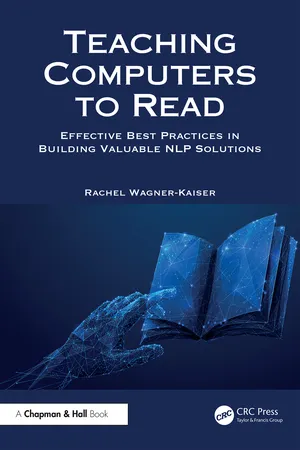
Teaching Computers to Read
Effective Best Practices in Building Valuable NLP Solutions
- English
- ePUB (mobile friendly)
- Available on iOS & Android
Teaching Computers to Read
Effective Best Practices in Building Valuable NLP Solutions
About this book
Building Natural Language Processing (NLP) solutions that deliver ongoing business value is not straightforward. This book provides clarity and guidance on how to design, develop, deploy, and maintain NLP solutions that address real-world business problems.
In this book, we discuss the main challenges and pitfalls encountered when building NLP solutions. We also outline how technical choices interact with (and are impacted by) data, tools, the business goals, and integration between human experts and the artificial intelligence (AI) solution. The best practices we cover here do not depend on cutting-edge modeling algorithms or the architectural flavor of the month. We provide practical advice for NLP solutions that are adaptable to the solution's specific technical building blocks.
Through providing best practices across the lifecycle of NLP development, this handbook will help organizations – particularly technical teams – use critical thinking to understand how, when, and why to build NLP solutions, what the common challenges are, and how to address or avoid those challenges. These best practices help organizations deliver consistent value to their stakeholders and deliver on the promise of AI and NLP.
A code companion for the book is available here: https://github.com/TeachingComputersToRead/TC2R-CodeCompanion
Frequently asked questions
- Essential is ideal for learners and professionals who enjoy exploring a wide range of subjects. Access the Essential Library with 800,000+ trusted titles and best-sellers across business, personal growth, and the humanities. Includes unlimited reading time and Standard Read Aloud voice.
- Complete: Perfect for advanced learners and researchers needing full, unrestricted access. Unlock 1.4M+ books across hundreds of subjects, including academic and specialized titles. The Complete Plan also includes advanced features like Premium Read Aloud and Research Assistant.
Please note we cannot support devices running on iOS 13 and Android 7 or earlier. Learn more about using the app.
Information
Table of contents
- Cover Page
- Half-Title Page
- Title Page
- Copyright Page
- Contents
- Acronyms and Definitions
- Preface
- Acknowledgments
- Chapter 1 Debunking Common Myths in Natural Language Processing
- Chapter 2 The Trajectory of Natural Language Processing: Classic, Modern, and Generative
- Chapter 3 Large Language Models and Generative Artificial Intelligence
- Chapter 4 Pre-processing and Exploratory Data Analysis for NLP
- Chapter 5 Framing the Task and Data Labeling
- Chapter 6 Data Curation for NLP Corpora
- Chapter 7 Machine Learning Approaches for Natural Language Problems
- Chapter 8 Working Across Languages in NLP
- Chapter 9 Evaluating Performance of NLP Solutions
- Chapter 10 Maintaining Value: Deploying and Monitoring NLP Solutions
- Chapter 11 NLPOps: The Mechanics of NLP Production at Scale
- Chapter 12 Ethics in Data Science and NLP
- Chapter 13 Key Factors for Successful NLP Solutions
- Index